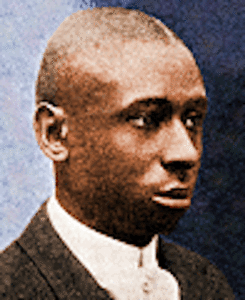
William Tyers
*On this date, in 1870, William Tyers was born. He was a Black musician and arranger.
William H. Tyers was born in Petersburg, Virginia, just south of Richmond, to former Virginia slaves Henry Tyers and his wife Jane "Jennie" Jones. After spending his first 12 years in Richmond, Virginia, Will's family moved to New York City to find a better situation. He found some interest in music and started piano lessons there. Tyers' teacher thought he showed a propensity not just for performance but for composition, harmony, and theory.
He started writing several pieces, although not initially published, in the mid-1880s, among them well-developed polkas and waltzes. His experiences increased his interest in music, and he set out to make it his living. Around the age of 20, Tyers' training led him to a music librarian and arranger job for a touring concert company. One of those tours was to Europe, where he fell into a good opportunity to study orchestration and arranging with Professor Gaspari in Hamburg. It was possibly from this venture that his first published composition appeared, Garnet: Grand March. Eventually, Tyer's health started to deteriorate while on the tour, so he returned to the United States, arriving from Hamburg in Manhattan on November 16, 1891, on the Normannia.
He kept working in music and arranging, building up a good reputation. In 1896, Tyers submitted his syncopated march work Sambo for publication. Some consider it to be one of the first true instrumental rags. It was issued by Frederick Alan "Kerry" Mills, who would later contribute the cakewalk At a Georgia Campmeeting, the waltz song Meet Me In St. Louis, Louis, and the intermezzo Red Wing into the world of ragtime era music. Soon, an orchestrated version of Sambo was available for New York bands to play. However, his Cuban dance Trocha brought attention to Tyers and his propensity for Latin or "Island" rhythms. It was rearranged and reissued in 1913 as a tango. This success led to an arranging job with the Joseph W. Stern firm in 1897.
Many Black composers and arrangers could never have hoped for a staff job at such a large publishing firm at that time, much less a salary guarantee, but Tyers was able to break through that racial ceiling successfully. His hiring may have been partly because Stern recognized the coming popularity of Black music forms. Aside from the Gotham-Attucks music formed later, he was one of the leading publishers of Black-composed ragtime and a popular song in New York in the 1900s and 1910s. In failing health, his final summer in 1923 was primarily spent at the Mount Washington Hotel. Will Tyers died of acute pneumonia in Manhattan the following spring, April 18, 1924, at age 54.